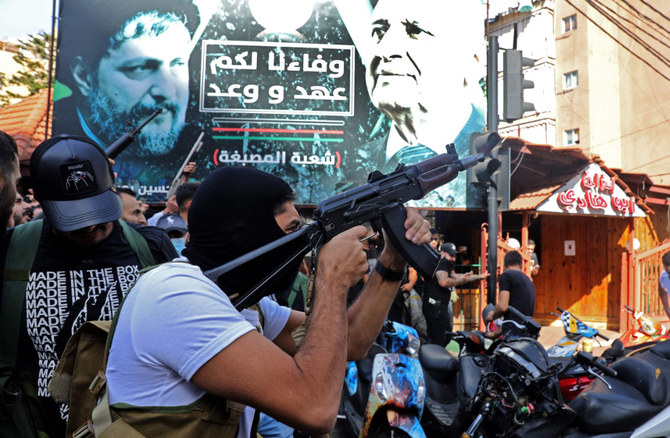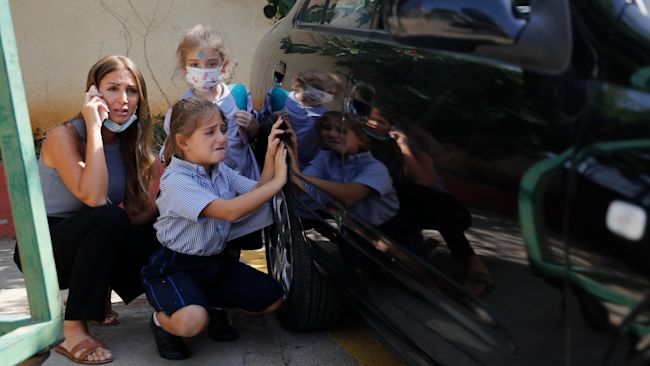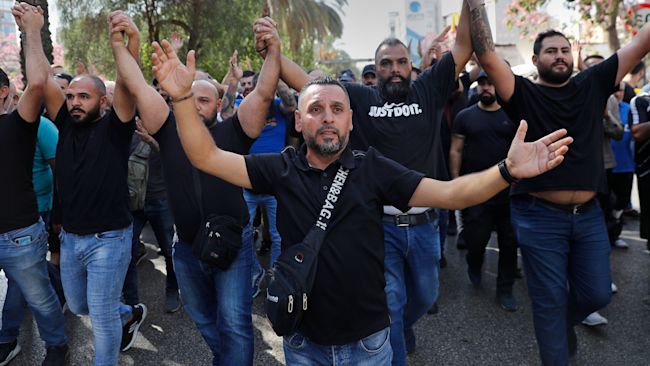Oct 17 (Reuters) – Saudi Arabia has advised its citizens not to travel to Lebanon in light of the latest security events, the foreign ministry wrote on Twitter on Sunday. Lebanon remains on a Saudi travel list where obtaining prior permission to visit is required. On Thursday, seven people were killed in violence in Beirut […]
تأتي ذكرى المولد النبوي الشريف هذا العام بعد انتكاسة أمنية تضاف ال النكبة الاقتصادية، كم نتمنى أن تكون عبرةً عابِرَةً فيعود “العيد” على اللبنانيين جميعا بالخير والبركة وبالظروف الحياتية الأفضل وأن يسود التفاهم والتآخي بيننا جميعًا فلا ندع الفتنة تغلبُ الروح الوطنية الطيّبة. إن دَخلَتِ الرحمةُ القلوب يحلّ الوِئام والسلام “وما أرسلناك إلّا رحمة للعالمين […]

By NAJIA HOUSSARI — arabnews.com — BEIRUT: Members of parliament hid in their homes on Saturday in fear of assassination by Hezbollah gunmen as new turmoil in Lebanon threatened to spiral out of control. Security services advised MPs from the Lebanese Forces party not to venture out amid growing tension over a judicial investigation into the Beirut port explosion in August 2020, which killed more than 200 people and devastated swaths of Beirut. “Yes, this advice was given to the MPs of the Lebanese Forces,” party media chief Charles Jabbour told Arab News. “There is fear of them being exposed to assassination and murder, which Hezbollah has practiced before. The solution requires that Hezbollah hand over its weapons to the state.” The crisis surrounds the investigation being conducted by Judge Tarek Bitar, who wants to question former and serving ministers linked to Hezbollah and the allied Amal Party about their responsibility for the deadly port blast. The ministers claim the judge’s actions are political, and have refused to cooperate.
Tensions erupted into violence last Thursday, when seven people were killed after gunfire erupted during a Hezbollah and Amal protest against the investigation in a mainly Christian area of central Beirut. Justice Minister Henry El-Khoury said on Saturday he supported Judge Bitar, who had the right to summon whoever he wanted in the case. “I stand by the … investigator,” El-Khoury said. He said he did not have the authority to replace Bitar, and faced no pressure to do so. The minister held crisis talks on Saturday to discuss the investigation with Prime Minister Najib Mikati, Supreme Judicial Council president Suhail Abboud and public prosecutor Ghassan Oueidat. They decided to invite Bitar to a meeting of the council on Tuesday. “Judge Abboud is committed to judicial, not political, approaches to resolving the problem,” a judicial source told Arab News.

by AFP — The spokesman for relatives of those killed in last year’s Beirut port blast quit on Saturday, following fears he had been intimidated into urging the dismissal of the lead investigator in the case. Shiite movement Hezbollah and allies have accused judge Tarek Bitar of political bias in his probe into the August 4, 2020 explosion that killed more than 210 people. Tensions came to a boil Thursday when seven people were killed in violence following a rally organised by Hezbollah and its ally Amal demanding Bitar’s dismissal. The shootout in central Beirut kept many residents trapped indoors for hours, reviving memories of Lebanon’s 1975-1990 civil war.
In a complete U-turn from his previous support for the investigator, Ibrahim Hoteit, a spokesman for the families of the victims, called in a video circulated Friday night for the judge to step down. Many social media users worried that Hoteit, whose brother was killed in the port explosion, had been threatened. In the video, he is seen glancing off camera as he speaks, in what some charge could be a sign of him speaking under duress. But Hoteit told AFP he had spoken only for himself and denied having recorded the video under any pressure. “The only pressure I came under were the events of Thursday and the fear of sliding into civil war,” he said. “I therefore decided to step down as spokesman” for the families. ‘180-degree turn’
Other victims’ relatives, who still support Bitar, said in a statement: “This position… does not represent us at all.” William Noun, whose firefighter brother died in the blast, told AFP that he remained firm in his support and that Hoteit “was without doubt pressured”. Lina Khatib, a senior analyst at the Chatham House think-tank, said the video was “alarming because it is a sudden 180-degree turn from earlier statements… in support of the port probe”. “In the video he appears to be under duress,” she said, and the wording of the statement was unlike his usual language. “All this suggests that Hoteit issued the video statement because he felt pressured to do so.” Top politicians subpoenaed in the blast investigation have launched various legal challenges against Bitar. But the latest court rulings have allowed him to resume the probe, which has been suspended multiple times. Bitar’s predecessor, Fadi Sawan, was removed by a court in February. Topics: Beirut , port blast , Tarek B
By William Christou — english.alaraby.co.uk — Lebanon’s major political forces issued escalatory statements following Thursday’s clashes, which left seven dead and more than 30 wounded. Safi al-Din, one of Hezbollah’s top officials, said that Thursday’s clashes were a result of American and Israeli meddling and warned that Hezbollah was ready to “defend the country.” Al-Akhbar, a magazine aligned with the Shia militia group, put a picture of Samir Geagea dressed as Hitler on its front page – saying that “[Hezbollah] has run out of patience”. Geagea is the leader of the Christian political party and former militia the “Lebanese Forces,” which Hezbollah accused of firing the first shots at yesterday’s protest.
Geagea, by contrast, denied Hezbollah’s claim that the Lebanese Forces fired the first shots on Thursday. Instead, he blamed the “proliferation” of weapons for the day’s violence. The clashes took place at the Tayouneh roundabout along a civil war-era fault line which divided Shia and Christian neighbourhoods. The scenes of huddled schoolchildren and fleeing civilians brought back not-so-distant memories of Lebanon’s civil war and rattled a country already in the throes of a multi-pronged crisis.
Funerals were held for the “martrys” of the clashes, most of whom were gunmen from the Shia Amal movement. Gunfire could be heard throughout Beirut as throngs of men shot rifles into the air in commemoration of their fallen comrades. A more solemn ceremony was held outside the house of Maryam Farhat, a 39-year old woman who was killed in her home by a stray bullet. Farhat’s face circulated social media as Lebanese mourned her death as the embodiment of an innocent civilian caught in the crossfire of a fight between militias. The issue which precipitated the clashes, the Beirut port explosion investigation, has only grown more divisive since Thursday.
By arabnews.com — RIYADH: Saudi Arabia said on Friday that the Kingdom is following events in Lebanon closely after gunfights in Beirut left six people dead on Thursday. The Kingdom hopes the situation will stabilize as soon as possible and that Saudi Arabia stands with the people of Lebanon, a foreign ministry statement said. The […]
فقدان مصداقية الدولة، انعدام ثقة المواطن بها، اهتزاز ثقة اللبنانيين ببعضهم، الانهيار الاقتصادي المخيف، عزلة لبنان عن محيطه والعالم، التدهور الامني المتكرر ، الارواح التي يزهقها الجوع والفقر والمرض والاقتتال المتكرر والعدو المتربص والارهاب وانفجار ٤ آب ، ألا يستحق كل ذلك العودة والجلوس إلى طاولة الحوار لمناقشة السلاح والحياد والحدود والعلاقات الدولية ؟ ألم […]

By By David Leonhardt and Sanam Yar — NYT – Weekly grocery bills can equal months of a typical family’s income. Banks are refusing to let people withdraw money. Basic medicines are often unavailable, and gas-station lines can last hours. Every day, many homes lack electricity. Lebanon is enduring a humanitarian catastrophe created by a financial meltdown. The World Bank has called it one of the worst financial crises in centuries. “It really feels like the country is melting down,” Ben Hubbard, a Times reporter who has spent much of the past decade in Lebanon, told us. “People have watched an entire way of living disappear.” It’s a shocking turnaround for a country that was one of the Middle East’s economic success stories in the 1990s. Given the scale of the suffering and the modest media attention it has received while the rest of the world remains focused on Covid-19, we are devoting today’s newsletter to explaining what has happened in Lebanon, with Ben’s help.
How did this happen?
:quality(70)/cloudfront-eu-central-1.images.arcpublishing.com/thenational/DRBUDAMSBHHLW7CK42FPXF5SZM.jpg)
By US Embassy in Lebanon — Under Secretary Nuland: Good afternoon, everyone, thank you for coming. I want to start today by expressing condolences on behalf of the American people for the tragic loss of life this morning outside the Palace of Justice. We join the Lebanese authorities in their call for calm and de-escalation of tensions. The health and future of Lebanon’s democracy depends on the ability of its citizens to address the difficult issues ahead for their country — peacefully, and through dialogue, and with confidence in the rule of law.
We came to Lebanon today at the request of President Biden and Secretaries Blinken and Yellen with an interagency delegation that includes the State Department and the Treasury, in order to meet with government leaders and civil society just weeks after the formation of a new government, in order to express our support for the aspirations of the Lebanese people for security, for economic stability and for transparent and accountable governance. Terrorists and thieves have robbed them of hope for far too long. After years of suffering, all Lebanese deserve better. The task ahead is daunting, but we stand with Lebanon as it does the hard work to restore economic stability and basic services, including reliable electricity, health care, and education to get this country on a sustainable path and back to prosperity.

A Lebanese mother with her children hide behind a car from sniper fire outside a school, in the Christian neighborhood of Ain el-Remaneh.Credit: AP

Supporters of the Shiite Hezbollah and Amal groups chant slogans against Judge Tarek Bitar.Credit: AP
by itv.com — At least six people have been killed and dozens more injured by gunfire in the Lebanese capital, Beirut. The deaths occurred as armed clashes broke out during a protest demanding an end to a judicial investigation into last year’s massive blast in the city’s port. The demonstration was led by the Shia Muslim groups Hezbollah and Amal, who protested outside the Justice Palace to demand the removal of Judge Tarek Bitar. Lebanon’s interior minister, Bassam Mawlawi, said many of those injured were shot by snipers from buildings. He described the events as “a very dangerous sign”. The protest also saw exchanges of fire involving, pistols, rifles and rocket-propelled grenades. Amid the chaos, four projectiles fell near a private French school, causing panic, a security official said. The students huddled in the central corridors with the windows open to avoid major impact.



